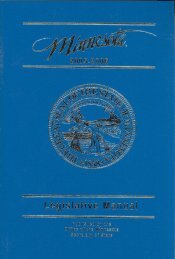Minnesota Board of Pharmacy - Minnesota State Legislature
Minnesota Board of Pharmacy - Minnesota State Legislature
Minnesota Board of Pharmacy - Minnesota State Legislature
You also want an ePaper? Increase the reach of your titles
YUMPU automatically turns print PDFs into web optimized ePapers that Google loves.
<strong>Minnesota</strong> Statutes §§214.10 and 214.103 require the <strong>Board</strong> to investigate every jurisdictional<br />
complaint. In the judgement <strong>of</strong> the <strong>Board</strong>, the <strong>Legislature</strong> quite correctly concluded that citizens should<br />
have the ability to file such complaints. Citizens also have the option <strong>of</strong> filing malpractice suits against<br />
health care pr<strong>of</strong>essionals. However, relying on malpractice suits alone to address incompetent,<br />
unethical and unsafe pr<strong>of</strong>essionals is not a good alternative. Having complaints investigated by experts<br />
can potentially result in corrective action being taken before a situation becomes so bad that people are<br />
severely injured. This sort <strong>of</strong> preventative strategy can help reduce the costs associated with medical<br />
errors and malpractice litigation.<br />
The <strong>Board</strong> reserves disciplinary action for the more egregious cases that come to its attention. For<br />
minor infractions, the <strong>Board</strong> issues informal warnings and provides suggestions to the licensees or<br />
registrants as to how they can come into compliance. The <strong>Board</strong>’s Surveyors then follow up at a later<br />
date to ensure that the suggestions have been followed. Licensees and registrants are most commonly<br />
disciplined for stealing controlled substances for their own use or to sell to others. The <strong>Board</strong> has also<br />
disciplined pharmacists for serious breaches <strong>of</strong> patient data privacy laws, sexual misconduct, drinking<br />
alcohol while on duty, inappropriately working with illicit Internet sites to dispense controlled<br />
substances to individuals without legally valid prescriptions, repeated failure to come into compliance<br />
with regulations and other serious infractions.<br />
Prescription Monitoring Program<br />
At least 35 states currently administer a prescription monitoring program. (Please see above for a<br />
complete description <strong>of</strong> <strong>Minnesota</strong>’s PMP). Some states take an “active” approach to controlled<br />
substance prescription monitoring and some, including <strong>Minnesota</strong>, take a more “passive” approach. In<br />
the “active” states, staff <strong>of</strong> the agency housing the PMP actively engage in “data-mining” and try to<br />
identify individuals who appear to be doctor-shopping. If an individual is so identified, the agency will<br />
send a letter to each prescriber and pharmacist from whom the individual received service. Some <strong>of</strong><br />
those states also try to identify inappropriate prescribing by practitioners or dispensing by pharmacies,<br />
reporting such individuals to the appropriate licensing board. One possible adverse consequence <strong>of</strong><br />
using a more “active” approach is the possibility <strong>of</strong> a “chilling effect” on appropriate prescribing. (That<br />
is, some practitioners may be more reluctant to prescribe controlled substances even when appropriate -<br />
for fear <strong>of</strong> having their prescribing practices questioned).<br />
The <strong>Board</strong>’s PMP staff does not engage in data-mining for the purpose <strong>of</strong> identifying doctor-shoppers<br />
or inappropriate prescribing and dispensing. Instead, the data collected by the <strong>Board</strong> is made available<br />
to prescribers, pharmacists and certain Department <strong>of</strong> Human Services (Medicaid) staff who apply for<br />
access. Law enforcement <strong>of</strong>ficials can obtain data upon presenting the <strong>Board</strong> with a search warrant and<br />
medical examiners have authority to request reports as well. In the judgment <strong>of</strong> the <strong>Board</strong>, <strong>Minnesota</strong>’s<br />
approach appropriately balances the need to identify doctor-shoppers and to prevent the “chilling<br />
effect” mentioned above.<br />
Other Considerations<br />
<strong>Minnesota</strong> Statutes §214.055 requires the <strong>Board</strong> to collect fees sufficient to cover expenditures. The<br />
fees that are collected are deposited in the <strong>State</strong> Government Special Revenue Fund (SGSRF). The<br />
<strong>Board</strong> may expend only those funds that are appropriated by the legislature, regardless <strong>of</strong> the amount <strong>of</strong><br />
fees that are collected. Like most <strong>of</strong> the health licensing boards, the board usually collects more fees<br />
30

















